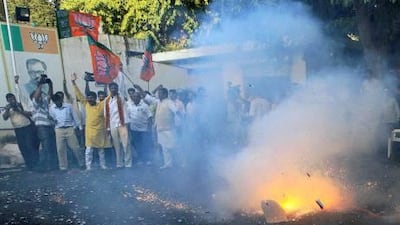NEW DELHI // Muslim leaders are criticising a Hindu campaign to reclaim two north Indian mosques they say is politically driven and could spark communal tensions.
Leading the campaign is Acharya Giriraj Kishore, the international vice president of the Vishwa Hindu Parishad, one of India's largest Hindu fundamentalist organisations, who has said that the recent Babri mosque ruling could pave the way for Hindus to retrieve more "Hindu holy places from Muslim occupation".
On September 30, a court ruled that the 460-year-old Babri mosque site in Ayodhya would be split into thirds with two-thirds belonging to Hindu groups and the remaining third going to the Muslim community. "Muslims would now also have to be ready to return to us the land beneath the two mosques where we used to have our temples in Mathura and Varanasi," Mr Kishore said last week.
However, Zafarul Islam Khan, a New Delhi-based Muslim scholar and community leader, said the call to retake the two sites was a ploy to divide Indians on communal lines and help the nationalist Hindu Bharatiya Janata Party (BJP) gain more Hindu votes.
"The idea behind the latest Hindu campaign is targeted to … polarise the majority Hindu voters in favour of the BJP," said Mr Khan, a former president of All India Muslim Majlis-e-Mushawarat, the umbrella body of Indian Muslim organisations. "The Hindu campaign also involves the danger of unleashing new communal tension across the country." The two sites are the Gyanvapi mosque in Varanasi and the Shahi Idgah mosque in Mathura. Hindu groups say Hindu temples were orginally built on the sites and that the Hindu deity Krishna was born in Mathura.
Although many legal experts believe the Places of Worship Act, passed in 1991, which says the religious character of a place of worship shall continue to be what it was on August 15, 1947, will prevent the Mathura and Varanasi mosques from going to Hindus, Hindu activists refuse to take their eyes off the two mosques in the wake of the Ayodhya ruling. "The Allahabad High Court has taken cognizance of the faith of millions of Hindus while deciding the Ayodhya case. The same way we shall be victorious in the cases in Mathura and Varanasi," Mr Kishore said.
Ravi Kant Garg, a BJP member of the Uttar Pradesh state assembly from Mathura, said he shared Mr Kishore's enthusiasm. "Our cadres are upbeat following the Ayodhya verdict. A new slogan is doing the rounds among them now: 'Ayodhya ho gayee hamari, ab Kashi-Mathura ki bari'," Mr Garg said, meaning Ayodhya has become ours, now it is the turn of Kashi-Mathura. Many Muslims worry that if the BJP throws its weight behind a campaign for the mosques, its support could trigger anti-Muslim violence.
"Communal riots broke out and many lives of mostly Muslims were lost when the BJP launched the country-wide movement for the Ram temple" in 1989, said Shabbir Husain, a Muslim community leader in Aligarh. Ram Puniyani, the secretary of the Mumbai-based Centre for the Study of Society and Secularism, said the Ayodhya verdict may have opened the floodgates for a resurgence of violent Hindu fundamentalist politics. "The communal forces are trying to hijack the national agenda on important bread and butter issues ... and whip up emotive issues like those in Mathura and Varanasi."
Although most historians agree that the Mathura mosque was built on the ruins of a razed temple, many say ancient history should not be used for modern political purposes. "There is no doubt that a temple was pulled down before the Mathura mosque was built," Irfan Habib, professor emeritus at Aligarh Muslim University, said yesterday. But "where is all this leading to? Conflicts from the past cannot be superimposed on the present."
foreign.desk@thenational.ae

